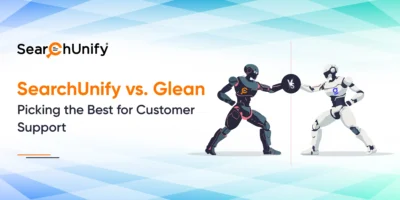
“Knowledge has to be improved, challenged, and increased constantly, or it vanishes.”
~ Peter Drucker
Knowledge is a treasured resource in the quick-moving enterprise landscape. Yet, 74% of enterprises fail to leverage their knowledge base correctly. Poor knowledge not only blocks productivity but also costs enterprises millions annually in operational efficiencies.
So, the question is – how can enterprises harness the power of knowledge to drive productivity, customer satisfaction, and ROI?
The answer lies in Knowledge Management (KM) Lifecycle—a systematic approach to creating, curating, and optimizing knowledge that transforms it into a strategic advantage.
Let’s delve deeper into how intelligent knowledge management solutions revolutionize the way enterprises operate.
Defining Knowledge Management Cycle
Before we proceed, let’s shed light on what exactly is the Knowledge Management Cycle.
Let’s say, your customer support team is a group of Intelligent Agents (Detectives) who constantly solve cases. Now, imagine they have a super-powered toolkit that helps them solve these cases quickly and effectively. This toolkit is the Knowledge Management (KM) Cycle.

Stage 1: Creating Knowledge
The creation of knowledge is the cornerstone of the KM lifecycle. It involves capturing insights, solutions, and processes from employees and transforming them into structured, reusable resources.
Challenges in Knowledge Creation
1. Misaligned Priorities
- Knowledge creation isn’t tied to agents’ KPIs, so they deprioritize it in favor of ticket resolution.
- Lack of immediate rewards discourages agents from documenting valuable insights.
2. Time Constraints
- High ticket volumes and tight deadlines leave little time for agents to document solutions.
- Knowledge documentation is often postponed and forgotten.
3. Limited Tools and Integration
- Switching between disconnected tools for documentation is tedious and time-consuming.
- Lack of integrated systems complicates the process, reducing efficiency.
4. Gaps in Technical Knowledge
- Agents may lack expertise to fully understand and document complex issues.
- Incomplete or incorrect information risks reducing the value of the knowledge base.
5. Hesitation in Content Creation
- Agents being problem solvers have their KRA of resolving queries rather than creating articles. The burden of knowledge creation disrupts the workflow.
- A lack of guidance or templates increases their reluctance to contribute to knowledge creation.
How Knowbler Addresses Knowledge Creation
SearchUnifys Knowbler redefines knowledge creation by embedding it seamlessly into workflows, empowering support teams to create, curate, and optimize knowledge efficiently.
- Smart Knowledge Creation Opportunities: With ML algorithms, Knowbler flags cases suitable for knowledge articles, offering agents actionable insights to create, skip, or refine content based on existing resources.
- Agentic AI-Fueled Templates: Pre-defined templates and AI-driven recommendations streamline article creation, ensuring consistency and high-quality outputs while saving time.
- Automated Knowledge Capture: By documenting repetitive queries automatically and utilizing knowledge articles from the knowledge base, Knowbler frees up agents to focus on resolving unique challenges.
- Case Cluster-Driven Topic Suggestions: Leveraging Agentic AI, it groups similar cases, identifies knowledge gaps, and recommends new article topics to keep the knowledge base relevant and comprehensive.
- Voice of the Customer Integration: Knowbler’s recommendations ensure content aligns with customer needs, enhancing self-service and customer support experiences.
Stage 2: Curating Knowledge
Once created, knowledge must be curated to ensure its relevance, accuracy, and usability. Poorly curated knowledge can lead to misinformation, longer resolution times, and decreased customer satisfaction.
Key Benefits of Effective Knowledge Curation
- Improved Accuracy: Eliminates outdated or redundant articles.
- Faster Access: Organizes information logically, reducing time spent searching for solutions.
- Higher Engagement: Encourages agents to trust and use the knowledge base.
How Knowbler Redefines Curation?
Knowbler’s intelligent analytics ensures that curated knowledge meets enterprise standards:
- Content Health Metrics: Analyzes uniqueness, metadata accuracy, and link validity.
- Duplicate Detection: Flags redundant articles before publication.
- Knowledge Gap Visualization: Identifies areas requiring additional content to close gaps in the knowledge base.
By adopting Knowbler, enterprises ensure their knowledge remains accurate, actionable, and impactful.
Stage 3: Optimizing Knowledge
Optimization ensures that knowledge assets are easily accessible and deliver maximum value. It involves refining content for usability, measuring its impact, and aligning it with organizational goals.
Why Optimization Matters to Enterprises?
- Increased ROI: Optimized knowledge bases can lead to a 25% improvement in ticket resolution time, reducing operational costs.
- Enhanced Customer Satisfaction: Customers value fast, accurate responses. A well-optimized knowledge base directly impacts Net Promoter Scores (NPS).
- Scalability: Ensures the knowledge base grows sustainably as the organization scales.
How Knowbler Excels in Optimization?
Knowbler leverages AI-driven insights to enhance knowledge usability continuously:
- Personalized Recommendations: Suggests next-best actions based on historical case data and customer behavior.
- Voice of the Customer Integration: Aligns knowledge content with evolving customer expectations for improved self-service and agent performance.
- Analytics for Impact Measurement: Tracks metrics like ROI, agent activity, and KM performance to identify optimization opportunities.
Want to Transform Knowledge into Business Value?
Let’s TalkQuick Fact: Enterprises with an optimized knowledge base report a 12% increase in CSAT scores.
Without a robust KM strategy, enterprises face:
- Escalated Costs: Redundant efforts and inefficient processes increase operational expenses.
- Lower Productivity: Agents spend more time searching for information than resolving issues.
- Knowledge Gaps: Critical information remains siloed, impacting decision-making and customer outcomes.
Knowbler eliminates these pain points by embedding knowledge creation, curation, and optimization into everyday workflows.
Implementing an advanced knowledge management solution like Knowbler isn’t just a tool investment—it’s a strategic move to future-proof your enterprise.
Ready to master the knowledge management lifecycle? Request a demo today.











